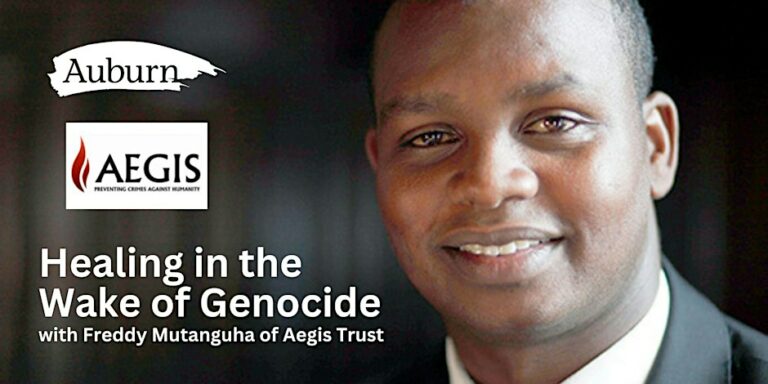
Auburn has invited Freddy Mutanguha of Aegis Trust to provide insight into healing and truth-telling in Rwanda. Mutanguha is the CEO of Aegis Trust, an international organization working to prevent genocide. Aegis honors the memory of the victims of genocide and enables students, professionals, decision-makers, and a wider public to meet survivors and learn from their experiences. Through education, Aegis works to build long-term peace by encouraging communities to change from mindsets of mistrust and prejudice to a position of shared responsibility for peace and stability.
Attend in person in our gorgeous gathering space at the Auburn offices.
RSVP now, space is limited. ID is required for entry.
Or join us online via Zoom; the link will be provided upon purchase of tickets.
Freddy Mutanguha
Freddy Mutanguha is CEO of the Aegis Trust and Director of the Kigali Genocide Memorial. Freddy led the development of Aegis’ peace education programme in Rwanda and is now leading Aegis’ work to take this model beyond the borders of Rwanda to areas at risk, including the Central African Republic, South Sudan and Kenya. Joining Aegis in 2004 during the construction of the Kigali Genocide Memorial as a team leader responsible for genocide documentation, he was appointed Country Director in 2006. Freddy is Chair of the board of Miracle Corner Rwanda, an organisation which aims to empower the community in Rwanda by helping young people to acquire the vocational skills they need to thrive socially and economically.
He holds a master’s degree in project management from the Maastricht School of Management and trained as a teacher, securing a bachelor’s degree in Education from the Kigali Institute of Education. He survived Rwanda’s 1994 genocide as a teenager, and as an orphan head of household, in 2016, the Justice and Security Foundation declared him a Peace Award winner for his outstanding contribution to peace. He is also profiled in the Atlanta Human Rights Museum as a prominent activist for human rights.
Helping to found AERG, Rwanda’s student survivors association, Freddy went on to become vice-President of IBUKA, the national umbrella association for Rwandan genocide survivors. He is an External Advisory Committee member of the USC Shoah Foundation’s Visual History Archive in Los Angeles, and lectures internationally on the impact of the Genocide and the importance of forgiveness as way of post-conflict reconstruction.
Auburn Theological Seminary's mission is to identify and strengthen leaders—from the pulpit to the public square—to build communities, bridge divides, pursue justice, and heal the world. To amplify its mission, the annual Dean’s lecture series provides a platform for leading religious and faith leaders and scholars to offer wisdom and insights into the world’s most pressing problems. Auburn invites leaders to speak to Auburn’s mission-centered theme.
To address the ongoing violence and trauma from conflicts across the globe, Auburn created partnerships with leaders and organizations engaged in the long work of “healing the world.” In the aftermath of geo-political turmoil, genocide, and the work for civil and human rights, the 2024 lecture series will focus on religious leaders who are healing the world for future generations.
This event is the second in a series of four lectures in 2024, including:
Presbyterian Minister and Children’s Television host Fred Rogers famously said, “Look for the helpers.” With a similar spirit, Auburn is looking for the healers. Who are those no longer satisfied with diagnosing social violence or participating in the ever-increasing ideological polarization, but are instead interested in healing the world? The dean’s lecture series invites the broader public to learn from and see themselves as healers of a world in need of repair. From students to faith and for-profit leaders who want to heal the world, the lectures are designed to invite us all to imagine a healed and more hope-filled world together. Each lecture will take place at the Janet Prindle Center for Prophetic Leadership, a 3,000 sq. ft. convening space at Auburn Theological Seminary. Programming will also be live-streamed online. In-person attendance will be restricted to 75 people.
Auburn has designed these lectures with four main objectives for audience members:
